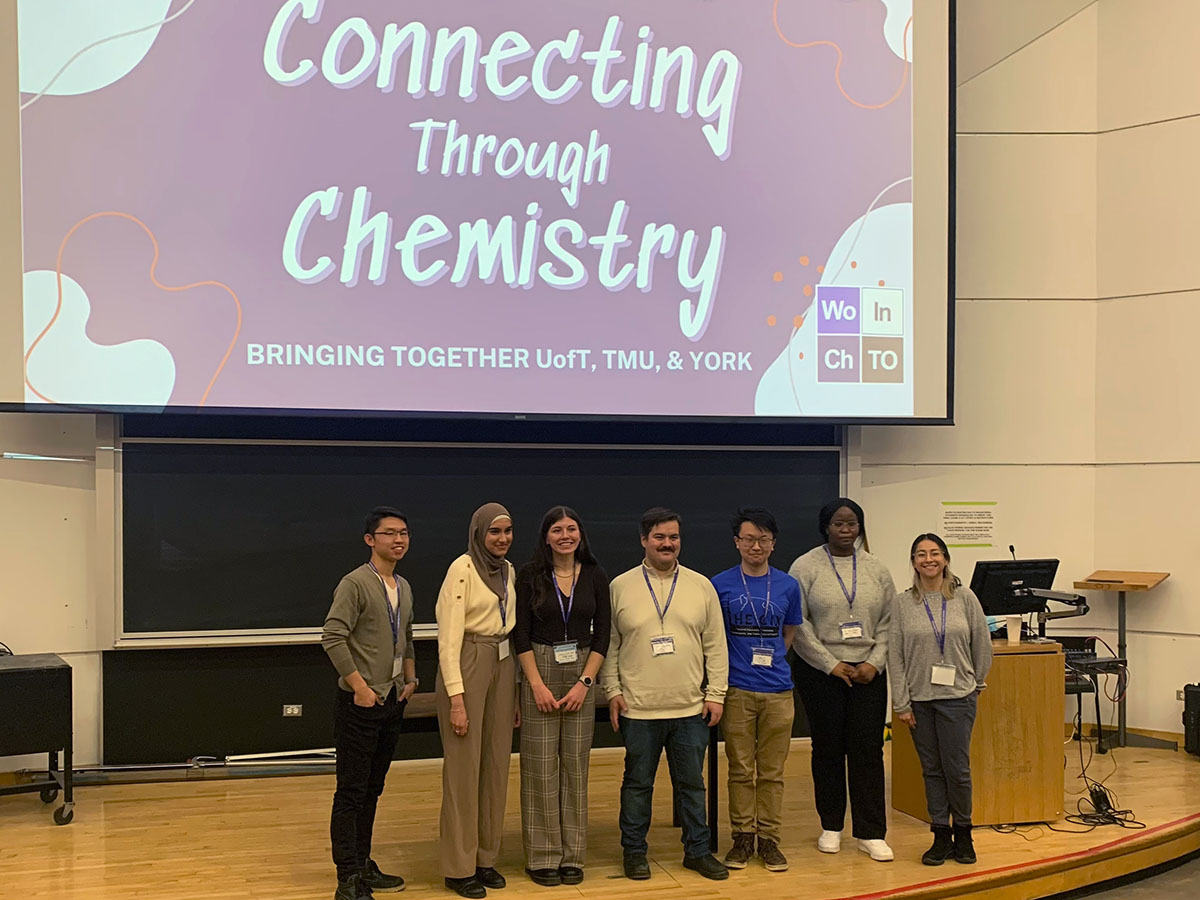Connecting through Chemistry: TMU molecular science master’s students present their research at EDI-focused symposium

Molecular science students Aaliya Pathan (second from left) and Osemudiamen Ibazebo (second from right) presented their thesis research through five-minute “flash talks”.
Two TMU Faculty of Science graduate students took part in the second annual Working Towards Inclusivity in Chemistry Toronto (external link) (WICTO) Symposium, an event that enables chemistry students from diverse backgrounds to learn about applying equity, diversity and inclusion (EDI) in science while sharing their research and building professional relationships with the local science community.
On January 27, 2024, molecular science master’s students Osemudiamen Ibazebo and Aaliya Pathan participated in an EDI workshop, heard insights from an alumni career panel, networked with their peers and presented their thesis research. Hosted at the University of Toronto’s St. George campus, the WICTO Symposium brought together chemistry graduate students and alumni from Toronto Metropolitan University, the University of Toronto and York University seeking to dismantle oppressive systems within academia, and make chemistry more welcoming to women and racialized students and practitioners.
“Chemistry as a whole seems like it’s told from one specific perspective. In terms of diversity, there still needs to be more work done,” Ibazebo says. “This is a great initiative because it reminds us of the importance of having different perspectives and ways of thinking in the sciences.”
“We all come to science with different experiences, backgrounds and life stories that can help us tackle different situations in science more effectively,” Pathan adds.
Ibazebo and Pathan’s sentiments echo those of others who have observed persistent gender and racial gaps in STEM disciplines (external link) at higher education institutions in North America. This social inequity issue becomes more important to address in the face of (PDF file) Canada’s shortage of STEM practitioners (external link) , which jeopardizes our economic competitiveness and quality of life.
For the sciences to be truly inclusive, it is vital to embed EDI principles in science practices, a topic TMU Chemistry and Biology professor Imogen Coe discussed in her plenary lecture. Coe invited attendees to critically consider the relationship between the scientist and the scientific process, and explained how skillfully embracing EDI can promote more dynamic and inclusive scientific exploration. She also engaged attendees in reflective exercises to illuminate how our unconscious biases can influence our perceptions.
“That was a nice reality check, because as scientists, we pride ourselves on being objective, but we need to remember that it’s humans who are doing the experiments, and humans have biases that can play into how we design and conduct experiments,” Ibazebo says.
Ibazebo and Pathan were part of a group of 12 students who delivered “flash talks”—five-minute presentations on their respective master’s research projects. Ibazebo is studying endocytosis, a mechanism through which cells obtain different materials to live by engulfing them with the cell membrane. Working as part of professor Costin Antonescu’s Lab for Fundamental and Cancer Cell Biology and professor Stefania Impellizzeri’s Lab for Nanomaterials & Molecular Plasmonics at TMU, she is using silica nanoparticles to study specific requirements, such as size and shape, and how they influence this 'cell-eating' mechanism. Pathan’s research, meanwhile, focuses on optimizing vitamin D deficiency testing, as the current dominant method is not sensitive to patients’ sex and ethnic differences. As a member of professor Darius Rackus’ Miniaturization in Bioanalysis Laboratory, she is developing a method involving electrochemistry that could allow for more inclusive testing.
“It was the first time I participated in something like this—I loved the opportunity to go out of my comfort zone,” Pathan says. “I also got to hear about a lot of fascinating research from different fields in chemistry.”
Another highlight for both students was a panel discussion in which 10 alumni of chemistry programs from WICTO’s three participating institutions discussed their career journeys. Working in areas such as research and development, business and public policy, they included a synthetic chemist with a pharmaceutical company, a chemistry software developer, a science and policy analyst with the federal government and a medical science liaison with a biotechnology company.
“Hearing from the panellists about their different experiences in chemistry opened my eyes to how I can use my skills in different ways, and gave me new ideas to further my career,” Pathan says.
Meanwhile, the networking workshop focused on the importance of making and maintaining connections with others to serve your career and ways to succeed at networking. It allowed participants to develop and practise a one-minute elevator pitch about their skills and goals. The symposium concluded with an informal networking social.
“The networking opportunities were great because you learn about what others are doing in their academic areas,” Ibazebo says. “I gained some new contacts whom I think could help me professionally down the line.”